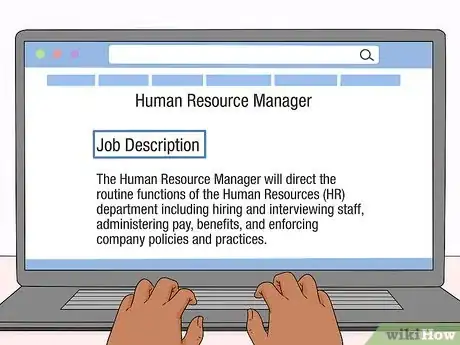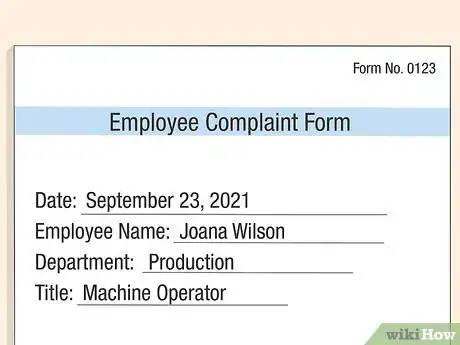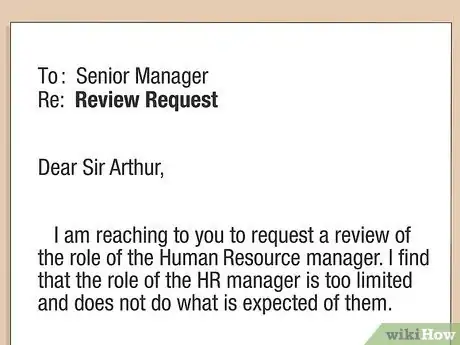This article was co-authored by wikiHow Staff. Our trained team of editors and researchers validate articles for accuracy and comprehensiveness. wikiHow's Content Management Team carefully monitors the work from our editorial staff to ensure that each article is backed by trusted research and meets our high quality standards.
This article has been viewed 52,922 times.
Learn more...
When you have a human resources problem that needs solving it is important to not give up, even when your human resources manager is vague, unhelpful, or pessimistic. Your human resource needs are very important and they need to be addressed by your HR department to your satisfaction. There may be any number of reasons behind the reticence or inability of a human resources manager to help you, but you should focus on changing the situation instead of figuring out why it is happening.[1] First, address the situation directly with the HR manager. Then, if you have done all you can do and the situation is not resolved, you may need to go to others in the company to get your needs met.
Steps
Doing Your Research
-
1Research relevant policies. When you have a discussion with HR you will need to bring your facts to the table. This means taking the time before a conversation to make sure that you have your facts straight. This could mean researching policies and laws, having a clear understanding of an incident and talking to witnesses, or getting examples of when the changes you are requesting have been implemented in other departments or companies.[2]
- If you're asking for a pay raise, you'll need to be able to prove that what you're asking for is what other people in your field are being paid.
- Compile your research into a format that you can present to the HR manager. Make the presentation format as clear as possible.
-
2Learn about the HR manager's job. Perhaps you are asking the human resources manager for something that is not in their job purview. In order to assess whether the manager is not doing their job or if you needed to go elsewhere for support to begin with, you should understand the job of a human resources manager, and a human resources worker in general.
- Human resources departments deal with the employees of a company.
- In most cases they are central to hiring and recruiting, firing, employee pay and benefits administration, and developing morale and training programs.
- They also deal with disputes between employees.
- Depending on the size of your company and its structure, the job of the HR department can differ.
Advertisement -
3Conduct follow up research. If you bring up an issue or problem with an HR manager and they respond with excuses or resistance to your proposed solutions, then you may need to do more research to back up your position. Don't assume that you will not be able to revisit an issue after your initial round of research and discussion.
- If you bring up a solution to a problem that ends up being against company policy, you may need to leave the meeting and do more research.
- If you have a frustrating conversation with an HR manager, be prepared to go away and see if you can find the holes in their reasoning.
- Come back with well-argued challenges to this if you still think they are not doing their job.
-
4Recognize professional limitations. It may be that you are stuck with someone who is inexperienced, does not yet understand your particular workplace or jurisdiction, or who is overwhelmed by too much work. Occasionally, but less often, you are dealing with someone who is simply lazy or makes arbitrary delineations as to who does what. In the latter case, knowing your rights is very important.
- Most HR managers will have had experience in the HR field before being promoted to the role of manager.
- Perhaps a new manager has experience in one aspect of HR and not in others.
- Keep this in mind and remember that it can take a while to get up to speed in the diverse role of manager.
- If you have a pressing issue and your HR manager is inept, then you will need to go elsewhere to get your issue dealt with.
Having a Constructive Conversation
-
1Talk to the HR manager directly. Tell them what you need and how you feel that they are not helping with your situation. If you talk to this person tactfully and respectfully, they will usually appreciate this feedback and may not even have realized how you felt.
- "I am having difficulty getting the proper health benefits instated, and I need you to complete the paperwork to resolve the issue."
- Be reasonable. Always make sure you are not asking for them to give you the moon when your position can only provide the clouds.
- The truth is that HR managers sometimes give the wrong answer inadvertently or simply don't perceive the problem properly.
-
2Listen to the HR manager. When they answer your questions and discuss the situation, be an active listener. Really focus on everything that they are saying instead of picking out pieces that irritate or upset you.
- Listening really actively could help you understand the HR manager's position or it could give you information you need to change the manager's position.
- Some ways to show that you are listening include making eye contact, nodding, and paraphrasing what the other person says.[3]
-
3Ask them to provide facts. If you are told something cannot be done, ask for the policy documents and the legislative background to be provided to you so that you can fully understand the issue. Often, this will be enough to alert the HR manager that you are not going away in a hurry. [4]
- "I would like to see that policy in writing so that I fully understand what it is outlining and prohibiting."
- Asking for documentation can make a human resources manager more responsive to your needs. However, if they are very weak, they may just refuse or ignore your request.
- It is a good idea to make your request in writing, usually over email. This will make a digital record of your request.
-
4Ask your HR manager why they are not prepared to assist. Explain clearly why you feel it is their role and not yours to pursue an employment matter and find a solution. Listen to their reasons as to why they perceive this situation differently. Ask them who they think should be dealing with your issue, if not them.
- "I understand that you will not address this issue. Who can you suggest that would have the authority to address my concerns?"
- Remember that the HR manager works for the employer, not you. Ultimately, they are looking after the best interests of the company.[5]
-
5Remain calm and professional. When discussing problems or issues with an HR manager it is important to have a calm and professional conversation no matter what you are discussing. Remember that you are at your place of business and you are a professional, no matter how the HR manager acts.
- Do not make the conversation personal or antagonistic, as this will not help your case or your relationship with the manager.
- In order to remain calm, you need to be able to identify when you are feeling overwhelmed.
- When you feel it coming on, take a few seconds to take deep breaths and calm your mind before continuing.
Finding Support Elsewhere
-
1Seek out other human resources employees to help you with your issue. If the manager of the human resources department is not able to help you with an issue you have, perhaps there is someone under their employ that can. A weak human resources manager often has employees that take up the slack, so they may be better able to than the manager can.
- In a large organization, there may be more than one human resources managers. If this is the case, you can search for a different HR manager to deal with your issue.
- Figure out what human resources employee deals, even peripherally, with your issue.
-
2Consult with your direct manager. If your problem or issue does not involve your manager, you can explain the problem to them and ask them to intervene. There may be something going on at a senior level that you are not able to fathom clearly but your manager may be able to address it.
- In some cases, if you are having an issue that HR is unwilling to address, an upper level employee will have more luck demanding that the issue is addressed.
- If your issue is with your direct supervisor, and HR is unwilling to address your concerns, then you will need to schedule a meeting with your supervisor's supervisor.
-
3File a complaint. If you aren't getting anywhere despite discussing the issue with the human resources department and your management they you will need to address it another way. File a complaint internally about not getting the employment support you need. Only do this after you have really tried to work it out through all avenues because this method should only be one of last resort.
- Be aware that filing a complaint can cause conflict for you within your department and within the larger company as a whole.
- However, you have a right to get your employee needs met.
- If your boss and HR team are unwilling to address them, then you have no other recourse than to step up your complaints.
-
4Seek review of the role of the HR manager. If, after all of your research and reading, you may simply find that the role of the HR manager is too limited and does not do what you expect of them. If this is the case, it can be a good idea to raise this fact with senior management and request a review of the role and level of input of the HR manager. In doing this, you will need to outline clearly what you and your colleagues think you should be getting from this role.
- Making your expectations for HR clear will help guide senior management in its decision of whether or not to review the role.
Community Q&A
-
QuestionThe HR department let an employee being written up see all evidence against him before he wrote his statement, now his statement is tailored to protect him specifically on what was written against him. Is this allowed?
 Community AnswerWhether this is allowed depends on what the policies of the company are. In many cases, an employee that is being reprimanded has a right to know exactly what is being said about them and their behavior. However, if you are concerned that your HR department is colluding with someone and not taking a a complaint seriously, you should take this issue up with management above the HR department.
Community AnswerWhether this is allowed depends on what the policies of the company are. In many cases, an employee that is being reprimanded has a right to know exactly what is being said about them and their behavior. However, if you are concerned that your HR department is colluding with someone and not taking a a complaint seriously, you should take this issue up with management above the HR department.
References
- ↑ http://money.usnews.com/money/blogs/outside-voices-careers/2013/07/29/5-secrets-you-should-know-about-hr
- ↑ http://www.cbsnews.com/news/when-your-hr-department-is-your-friend/
- ↑ http://www.wsj.com/articles/how-active-listening-makes-both-sides-of-a-conversation-feel-better-1421082684
- ↑ http://www.cbsnews.com/news/when-your-hr-department-is-your-friend/
- ↑ http://money.usnews.com/money/blogs/outside-voices-careers/2013/07/29/5-secrets-you-should-know-about-hr




































































